Blog - Foot Doctor, Chambersburg and McConnellsburg, PA
Shoes for Athletes With Flat Feet
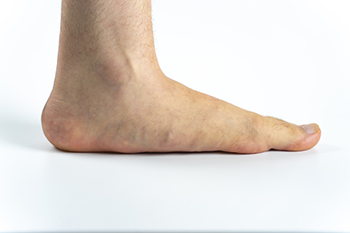
If you have flat feet and also engage in physical activities that involve walking or running, finding the right shoes can be challenging. Flat feet is a condition where the arch has collapsed and the sole of the foot lies flat on the ground while standing. A normal foot arch allows the weight to be evenly transferred from the toes to the heels with each step. Patients who have flat feet are unable to do this, which can present problems in the feet, hips, and back, especially in active people. A number of shoes that have arch support may help to eliminate the symptoms of having flat feet, but these one-size-fits-all inserts may not be enough. Custom orthotics are another option that many patients consider. A podiatrist can examine the feet and create an insole that can best counter the effects of flat feet, and can fit well into any shoes that are purchased. An impression of the feet will be taken, and an orthotic device can be constructed which can give provide adequate arch support. If you enjoy running and have flat feet, it is suggested that you consult a podiatrist, who can help you with relief options.
Flatfoot is a condition many people suffer from. If you have flat feet, contact Dr. Steven Schwartz from Pennsylvania. Our doctor will treat your foot and ankle needs.
What Are Flat Feet?
Flatfoot is a condition in which the arch of the foot is depressed and the sole of the foot is almost completely in contact with the ground. About 20-30% of the population generally has flat feet because their arches never formed during growth.
Conditions & Problems:
Having flat feet makes it difficult to run or walk because of the stress placed on the ankles.
Alignment – The general alignment of your legs can be disrupted, because the ankles move inward which can cause major discomfort.
Knees – If you have complications with your knees, flat feet can be a contributor to arthritis in that area.
Symptoms
- Pain around the heel or arch area
- Trouble standing on the tip toe
- Swelling around the inside of the ankle
- Flat look to one or both feet
- Having your shoes feel uneven when worn
Treatment
If you are experiencing pain and stress on the foot you may weaken the posterior tibial tendon, which runs around the inside of the ankle.
If you have any questions please feel free to contact our offices located in Chambersburg, and Mcconnellsburg, PA . We offer the newest diagnostic and treatment technologies for all your foot and ankle needs.
Who Can Develop Tarsal Tunnel Syndrome?
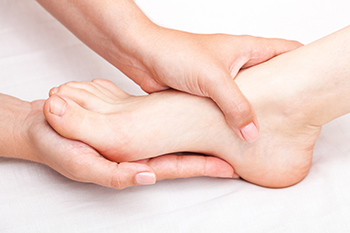
The foot condition that is known as tarsal tunnel syndrome is caused by repetitive pressure. The tibial nerve is affected by this ailment and is located inside the tarsal tunnel. There are various reasons why this nerve can become irritated. People who have severely flat feet may have ankle pain, possibly indicating tarsal tunnel syndrome has developed. Additionally, inflammation from medical conditions, such as arthritis or diabetes, may lead to getting tarsal tunnel syndrome. People who are born with certain foot deformities may experience this condition as well and are generally under the care of a podiatrist. Additional symptoms that are associated with tarsal tunnel syndrome can consist of pain in the Achilles tendon area, swollen ankles, or a feeling of warmth when touched. If you have this condition, it is strongly suggested that you consult with a podiatrist who can offer you the correct treatment options.
Tarsal tunnel syndrome can be very uncomfortable to live with. If you are experiencing tarsal tunnel syndrome, contact Dr. Steven Schwartz of Pennsylvania. Our doctor can provide the care you need to keep you pain-free and on your feet.
Tarsal Tunnel Syndrome
Tarsal tunnel syndrome, which can also be called tibial nerve dysfunction, is an uncommon condition of misfiring peripheral nerves in the foot. The tibial nerve is the peripheral nerve in the leg responsible for sensation and movement of the foot and calf muscles. In tarsal tunnel syndrome, the tibial nerve is damaged, causing problems with movement and feeling in the foot of the affected leg.
Common Cause of Tarsal Tunnel Syndrome
- Involves pressure or an injury, direct pressure on the tibial nerve for an extended period of time, sometimes caused by other body structures close by or near the knee.
- Diseases that damage nerves, including diabetes, may cause tarsal tunnel syndrome.
- At times, tarsal tunnel syndrome can appear without an obvious cause in some cases.
The Effects of Tarsal Tunnel Syndrome
- Different sensations, an afflicted person may experience pain, tingling, burning or other unusual sensations in the foot of the affected leg.
- The foot muscles, toes and ankle become weaker, and curling your toes or flexing your foot can become difficult.
- If condition worsens, infections and ulcers may develop on the foot that is experiencing the syndrome.
A physical exam of the leg can help identify the presence of tarsal tunnel syndrome. Medical tests, such as a nerve biopsy, are also used to diagnose the condition. Patients may receive physical therapy and prescriptive medication. In extreme cases, some may require surgery.
If you have any questions please feel free to contact our offices located in Chambersburg, and Mcconnellsburg, PA . We offer the newest diagnostic and treatment technologies for all your foot and ankle needs.
Gently Exercising May Help to Prevent Falling
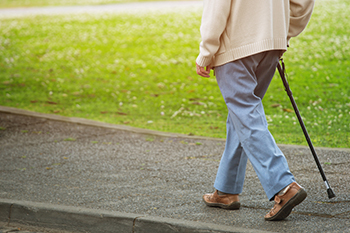
People who are 65 years old or older have increased chances of incurring a fall. A common reason this can happen may be a result of decreasing body strength as aging happens. A good fall prevention technique can include implementing a gentle exercise routine that can increase cardiovascular and muscle strength. Falling can have serious consequences, and may affect the feet. A broken ankle or toe may cause pain and difficulty in completing daily activities. Research has shown there are several thousand seniors who live independently, and many falls can occur in the home. Fall prevention strategies can include removing worn rugs from the living area, and it is helpful to improve lighting in the main areas of the household. Many people choose to have grab bars installed in the shower and toilet area, and it is beneficial to use a non-slip bath mat. If you would like to have additional knowledge about effective fall prevention techniques, it is suggested that you consult with a podiatrist who can help you with methods that can protect the feet.
Preventing falls among the elderly is very important. If you are older and have fallen or fear that you are prone to falling, consult with Dr. Steven Schwartz from Pennsylvania. Our doctor will assess your condition and provide you with quality advice and care.
Every 11 seconds, an elderly American is being treated in an emergency room for a fall related injury. Falls are the leading cause of head and hip injuries for those 65 and older. Due to decreases in strength, balance, senses, and lack of awareness, elderly persons are very susceptible to falling. Thankfully, there are a number of things older persons can do to prevent falls.
How to Prevent Falls
Some effective methods that older persons can do to prevent falls include:
- Enrolling in strength and balance exercise program to increase balance and strength
- Periodically having your sight and hearing checked
- Discuss any medications you have with a doctor to see if it increases the risk of falling
- Clearing the house of falling hazards and installing devices like grab bars and railings
- Utilizing a walker or cane
- Wearing shoes that provide good support and cushioning
- Talking to family members about falling and increasing awareness
Falling can be a traumatic and embarrassing experience for elderly persons; this can make them less willing to leave the house, and less willing to talk to someone about their fears of falling. Doing such things, however, will increase the likelihood of tripping or losing one’s balance. Knowing the causes of falling and how to prevent them is the best way to mitigate the risk of serious injury.
If you have any questions, please feel free to contact our offices located in Chambersburg, and Mcconnellsburg, PA . We offer the newest diagnostic and treatment technologies for all your foot care needs.
Poison Rashes and the Feet
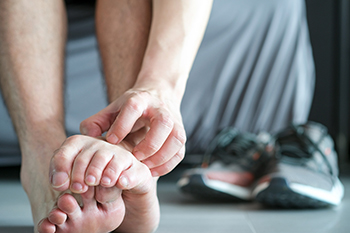
Having a rash on the feet can occur for several reasons. Poison ivy, oak, and sumac are common causes of rashes on the feet and often result in severe itching, blisters, and pain. They are caused by contact with an oily sap, called urushiol, that is found in some plants, possibly causing a rash to develop within 12 to 72 hours after contact. Some of these can clear up within three weeks. Treating any itching is suggested to prevent scratching and possible infection. If an individual has a serious reaction to these poisons, difficulty in breathing may ensue and it is critical to see a medical care provider as soon as possible. Prevention tips for poison rashes on the feet include wearing closed-toed shoes while outside in nature where the feet might possibly be exposed to troublesome plants. If one gets this type of rash, it will be less severe if washed with soap and water immediately and the clothes and shoes involved are disinfected. Since there are other causes of rashes on the feet and symptoms can be similar, if you have developed such a rash and you are experiencing foot pain, it is suggested that you see a podiatrist to have your condition diagnosed and properly treated.
Foot Pain
Foot pain can be extremely painful and debilitating. If you have a foot pain, consult with Dr. Steven Schwartz from Pennsylvania. Our doctor will assess your condition and provide you with quality foot and ankle treatment.
Causes
Foot pain is a very broad condition that could be caused by one or more ailments. The most common include:
- Bunions
- Hammertoes
- Plantar Fasciitis
- Bone Spurs
- Corns
- Tarsal Tunnel Syndrome
- Ingrown Toenails
- Arthritis (such as Gout, Rheumatoid, and Osteoarthritis)
- Flat Feet
- Injury (from stress fractures, broken toe, foot, ankle, Achilles tendon ruptures, and sprains)
- And more
Diagnosis
To figure out the cause of foot pain, podiatrists utilize several different methods. This can range from simple visual inspections and sensation tests to X-rays and MRI scans. Prior medical history, family medical history, and any recent physical traumatic events will all be taken into consideration for a proper diagnosis.
Treatment
Treatment depends upon the cause of the foot pain. Whether it is resting, staying off the foot, or having surgery; podiatrists have a number of treatment options available for foot pain.
If you have any questions, please feel free to contact our offices located in Chambersburg, and Mcconnellsburg, PA . We offer the newest diagnostic and treatment technologies for all your foot care needs.
How Does a Sprained Toe Happen?
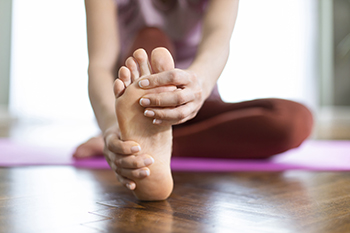
A sprained toe is a common foot condition. It can occur for a variety of reasons, that include an injury or accident causing the toe to bend beyond its normal range. When a toe is sprained, ligaments are overstretched or damaged. The toe may be swollen and bruised, and it can be painful to move, but walking is still possible. A Grade 1 sprain is known to be a mild sprain that consists of stretching of the ligaments and perhaps some microscopic tears. A Grade 2 sprain is a partial tear with more noticeable swelling and tenderness. A Grade 3 sprain happens when the ligament is completely torn, and the pain level is significant. Since it is difficult to distinguish between a sprained toe and a fractured toe, it is suggested that if you have sustained a toe injury, a podiatrist be consulted who can properly diagnose what has happened and provide appropriate treatment.
Toe pain can disrupt your daily activities. If you have any concerns, contact Dr. Steven Schwartz of Pennsylvania. Our doctor can provide the care you need to keep you pain-free and on your feet.
What Causes Toe Pain?
Most severe toe pain is caused due to a sports injury, trauma from dropping something heavy on the toe, or bumping into something rigid. Other problems can develop over time for various reasons.
Toe pain can be caused by one or more ailments. The most common include:
- Trauma
- Sports injury
- Wearing shoes that are too tight
- Arthritis
- Gout
- Corns and calluses
- Hammertoe
- Bunions
- Blisters
- Ingrown toenails
- Sprains
- Fractures (broken bones)
- Dislocations
When to See a Podiatrist
- Severe pain
- Persistent pain that lasts more than a week
- Signs of infection
- Continued swelling
- Pain that prevents walking
Diagnosis
In many cases the cause of toe pain is obvious, but in others, a podiatrist may want to use more advanced methods to determine the problem. These can range from simple visual inspections and sensation tests to X-rays and MRI scans. Prior medical history, family medical history, and any recent physical traumatic events will all be taken into consideration for a proper diagnosis.
Treatment
Treatments for toe pain and injuries vary and may include shoe inserts, padding, taping, medicines, injections, and in some cases, surgery. If you believe that you have broken a toe, please see a podiatrist as soon as possible.
If you have any questions please feel free to contact our offices located in Chambersburg, and Mcconnellsburg, PA . We offer the newest diagnostic tools and technology to treat your foot and ankle needs.
Broken Ankle Recovery
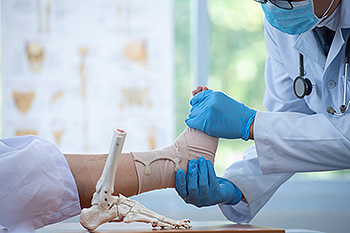
Various parts of the foot are affected when a broken ankle occurs. The ligaments, tendons, and nerves surrounding the ankle can become damaged, which can add to the pain and discomfort that is associated. A broken ankle may happen from a fall or a heavy object dropping on it. The average recovery time for a broken ankle is approximately six weeks, and it is beneficial to slowly resume activities that require walking or running. Patients who have diabetes may notice it can take longer to recover from a broken ankle, and it can help to closely monitor blood sugar levels. Consuming healthy foods and engaging in a gentle upper-body exercise routine may lead to a faster recovery. If you have broken your ankle, it is suggested that you confer with a podiatrist who can confirm the diagnosis and begin treatment.
Broken ankles need immediate treatment. If you are seeking treatment, contact Dr. Steven Schwartz from Pennsylvania. Our doctor can provide the care you need to keep you pain-free and on your feet.
Broken Ankles
A broken ankle is experienced when a person fractures their tibia or fibula in the lower leg and ankle area. Both of these bones are attached at the bottom of the leg and combine to form what we know to be our ankle.
When a physician is referring to a break of the ankle, he or she is usually referring to a break in the area where the tibia and fibula are joined to create our ankle joint. Ankles are more prone to fractures because the ankle is an area that suffers a lot of pressure and stress. There are some obvious signs when a person experiences a fractured ankle, and the following symptoms may be present.
Symptoms of a Fractured Ankle
- Excessive pain when the area is touched or when any pressure is placed on the ankle
- Swelling around the area
- Bruising of the area
- Area appears to be deformed
If you suspect an ankle fracture, it is recommended to seek treatment as soon as possible. The sooner you have your podiatrist diagnose the fracture, the quicker you’ll be on the way towards recovery.
If you have any questions, please feel free to contact our offices located in Chambersburg, and Mcconnellsburg, PA . We offer the newest diagnostic and treatment technologies for all your foot care needs.
Effective Care Tips for Healthy Feet

The feet are one of the areas of the body that are often neglected. Painful foot conditions may develop as a result of this, and may easily be avoided when everyday foot care methods are implemented. These can begin with maintaining a healthy weight, which can protect the feet from enduring extra pressure. After the feet are washed and dried daily, it is beneficial to apply a good moisturizer, which can help to keep the skin looking and feeling smooth. An extremely important foot care tip consists of wearing shoes that fit correctly. It is noted to be one of the best preventive measures that can help with mobility, in addition to maintaining maximum comfort. The feet are the foundation of the body, and stretching the feet is a good way to keep them strong. If you would like more information about effective foot care techniques, it is suggested that you consult with a podiatrist who can provide you with the information you are seeking.
Everyday foot care is very important to prevent infection and other foot ailments. If you need your feet checked, contact Dr. Steven Schwartz from Pennsylvania. Our doctor can provide the care you need to keep you pain-free and on your feet.
Everyday Foot Care
Often, people take care of their bodies, face and hair more so than they do for their feet. But the feet are a very important aspect of our bodies, and one that we should pay more attention to. Without our feet, we would not be able to perform most daily tasks.
It is best to check your feet regularly to make sure there are no new bruises or cuts that you may not have noticed before. For dry feet, moisturizer can easily be a remedy and can be applied as often as necessary to the affected areas. Wearing shoes that fit well can also help you maintain good foot health, as well as making it easier to walk and do daily activities without the stress or pain of ill-fitting shoes, high heels, or even flip flops. Wearing clean socks with closed shoes is important to ensure that sweat and bacteria do not accumulate within the shoe. Clean socks help to prevent Athlete’s foot, fungi problems, bad odors, and can absorb sweat.
If you have any questions please feel free to contact our offices located in Chambersburg, and Mcconnellsburg, PA . We offer the newest diagnostic and treatment technologies for all your foot and ankle needs.
Benefits of Becoming a Podiatrist
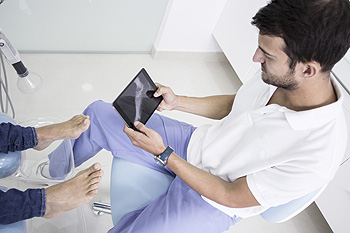
The job of a podiatrist is to treat foot conditions. These can include bunions, hammertoes, or a multitude of ailments that affect the lower extremities. A benefit of choosing podiatry as a career can be a desirable work-life balance. This may be a result of having limited emergencies and a predictable work schedule. The education requirements to become a podiatrist begins with obtaining a bachelor's degree, followed by enrolling in an accredited podiatry school. This will earn the potential doctor a degree that is called Doctor of Podiatric Medicine, or DPM. This will take four years to complete, and courses such as biology, anatomy, and pathology will be taught. After this is completed, a residency program begins for three years, giving the candidate an opportunity to interact with patients. People who are interested in pursuing a career in podiatry are urged to speak with this type of doctor, who can help them determine if this is a right choice for them.
If you are experiencing pain in the feet or ankles, don’t join the stubborn majority refusing treatment. Feel free to contact Dr. Steven Schwartz from Pennsylvania. Our doctor can provide the care you need to keep you pain-free and on your feet.
What Is a Podiatrist?
Someone would seek the care of a podiatrist if they have suffered a foot injury or have common foot ailments such as heal spurs, bunions, arch problems, deformities, ingrown toenails, corns, foot and ankle problems, etc.
Podiatric Treatment
A podiatrist will treat the problematic areas of the feet, ankle or lower leg by prescribing the following:
- Physical therapy
- Drugs
- Orthotic inserts or soles
- Surgery on lower extremity fractures
A common podiatric procedure a podiatrist will use is a scanner or force plate which will allow the podiatrist to know the designs of orthotics. Patients are then told to follow a series of tasks to complete the treatment. The computer will scan the foot a see which areas show weight distribution and pressure points. The podiatrist will read the analysis and then determine which treatment plans are available.
If you have any questions please feel free to contact our offices located in Chambersburg, and Mcconnellsburg, PA . We offer the newest diagnostic and treatment technologies for all your foot and ankle needs.



